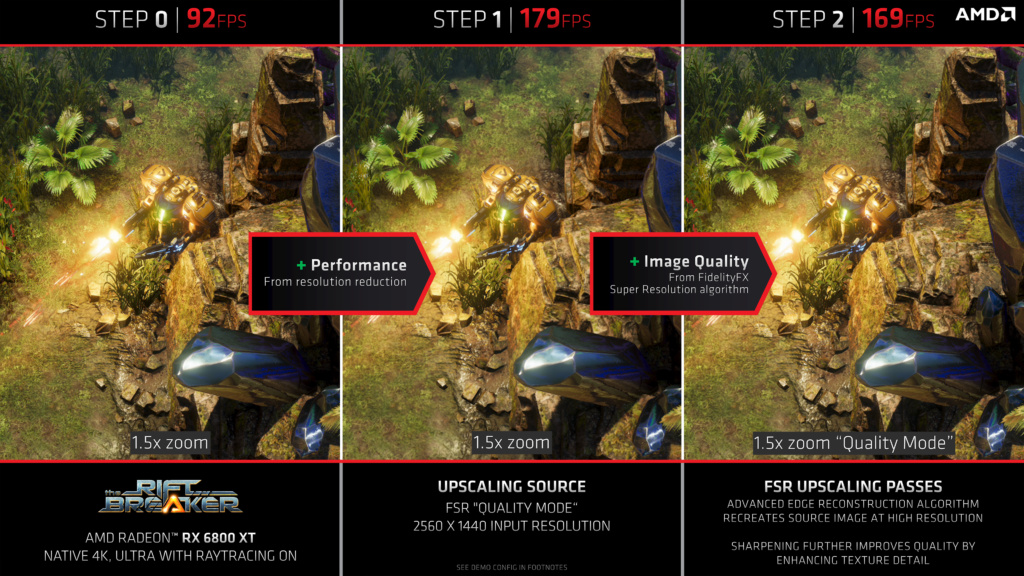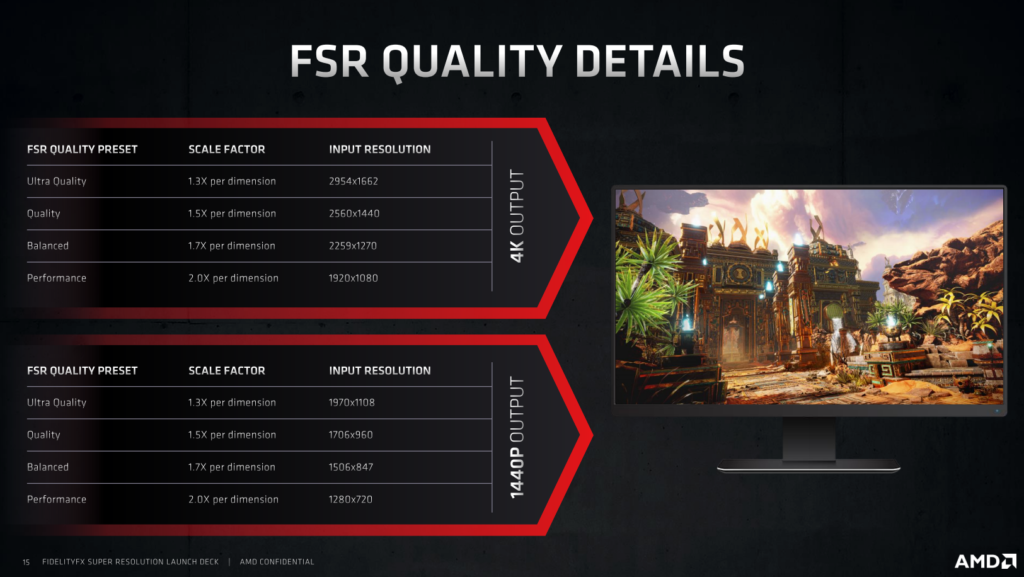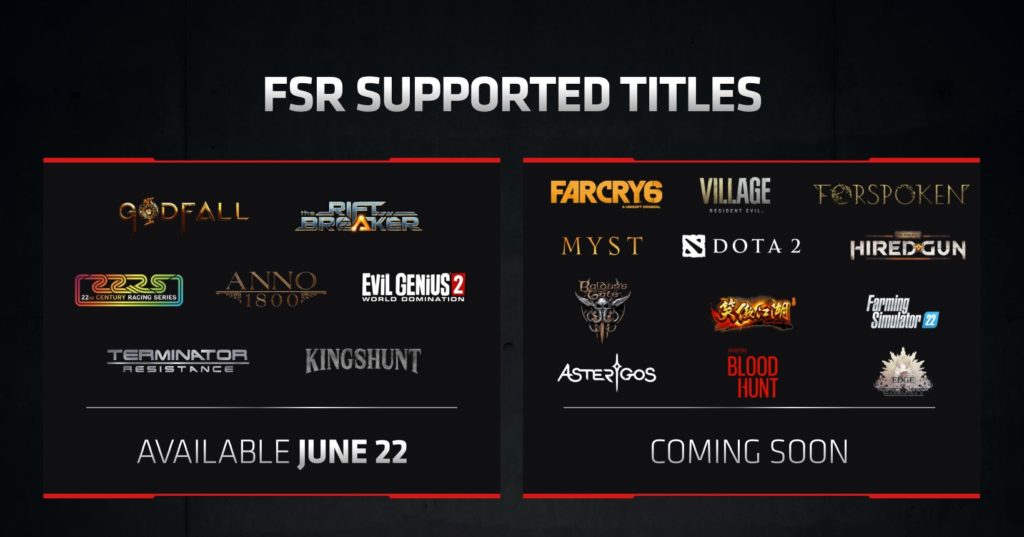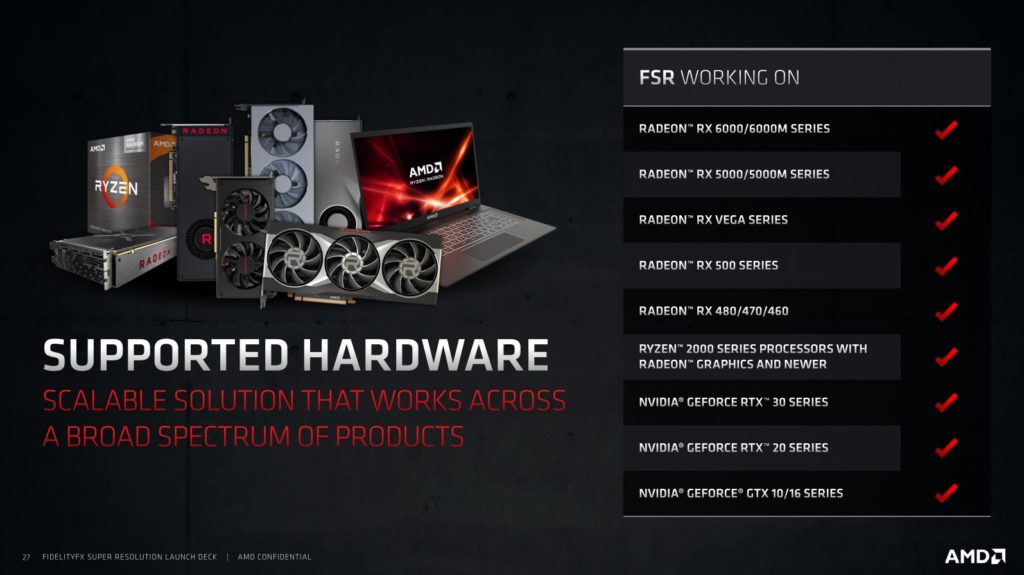After months of wait, AMD has finally launched its FidelityFX Super Resolution (FSR) feature to be used in games for free performance, and hopefully, image quality.
How AMD’s FSR Works, and How It’s Different From DLSS
While FSR might look like it’s a competitor to NVIDIA’s DLSS (and it functionally is), the way it works is quite different, and so it requires a different set of expectations going into it. Here’s AMD’s description of how FSR works in the graphics pipeline, which is done with 2 passes.

For FSR to be active, an anti-aliased image with tone mapping is needed as a base on top of which the upscaling and sharpening passes occur. Post-process effects like film grain are added on top of this resulting image, with the game HUD coming in last. AMD is claiming that it’s easy for developers to integrate FSR into their games.
While Super Resolution doesn’t require training on a per-game basis on neural networks as DLSS does, we’ve to see an increasingly growing adoption of the latter thanks to its integration in major game engines as a plug-in directly. Team red is banking on the open-source nature of FSR for (hopefully) an increased adoption rate, and it’s being cross-platform is certainly a nice incentive for more developers to jump in on.

However, as much as the company may show that it’s doing a favour to its competitor’s older graphics cards, that isn’t helped by the fact that FSR doesn’t look great when gaming at 1080p. For what it’s worth, AMD recommends not using it for image quality comparisons at that resolution, and the picture should be clear with what internal resolutions are used across different targets, as shown in the image above.
The comparison between the 2 technologies is certainly something AMD would have seen coming, and while that may not be fair seeing as both are different, their target result and expectations from gamers are the same. Right now, AMD claims that FSR delivers a 2.4x performance boost at 4K when using the lowest image quality setting – the ‘performance’ mode. From our early tests with the feature, we can confirm that the multiplier is pretty much accurate with our results in supported games. Speaking of supported games-
7 Games Supporting FSR At Launch, With More to Come Soon

The list of games supporting Super Resolution at launch is a little underwhelming, but there are some heavy hitters which will get in on the action soon. Here are the games with FSR support at launch, starting later today:
- Godfall
- The Riftbreaker
- Anno 1800
- Evil Genius 2
- Terminator Resistance
- Kingshunt
- 22 Racing Series
The following games will get the feature “soon”:
- Far Cry 6
- Resident Evil Village
- Forspoken
- DOTA 2
- Necromunda Hired Gun
- Myst
- Baldur’s Gate
- Farming Simulator 22
- Edge of Eternity
- Vampire The Masquerade – Bloodhunt
- Asterigos
- Swordsman Remake
AMD FSR Supported Hardware

AMD is being quite generous with the amount of hardware support for FSR, which makes sense since it’s a purely shader based solution. The feature is supported on the following hardware, but obviously more optimized for AMD GPUs, at least at launch:
- Radeon RX 6000 and RX 5000 (Desktop and mobile)
- Radeon RX Vega
- RX 500 series, RX 460 and above
- NVIDIA Geforce RTX 20 and RTX 30 series
- NVIDIA Geforce GTX 10 and 16 series
- Ryzen 2000 APUs and above
We are currently testing FidelityFX Super Resolution across a variety of supported games, and will have a review up soon regarding how it performs on NVIDIA graphics cards.
AMD FidelityFX Super Resolution is out now and optimized for AMD GPUs via the latest Radeon software adrenaline driver update.
